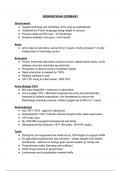BISMARCKIAN GERMANY
Government
● Viewed reichstag and minorities (10% pop) as reichsfeinde
● Outlawed the Polish language being taught in schools
● Prussia made up 60% pop + 2/3 landmass
● Divisions between rich+poor, north+south
Army
● Army was conservative, served for 2-3 years, mostly prussian + mostly
independent of reichstag control
Economic
● French indemnity payments caused a boom, helped assist banks, build
railways and new industries eg electricity
● Production in alsace-lorraine increased rapidly
● Steel production increased by 700%
● Railway doubled in size
● 1871 5% living in urban areas, 1900 25%
Army Budget 1874
● Bm used realpolitik + believed in nationalism
● Army budget 1874 : Bismarck proposed the army be automatically
financed by federal expenditure, this threatened to reduce the
Reichstags monetary powers, military budget set at 80% for 7 years
Kulturekampf
● NLs 1871-1879 : against Catholicism
● Kulturekampf: 1872- Catholic schools bought under state supervision
● 1873 may laws
● By 1878 BM accepted Kulturekampf had failed
● Strengthened the Zentrum (1871=58 seats, 1874=91 seats)
Tarifs
● During NL era supported free trade but by 1979 began to support tariffs
● Gr agriculture experienced bad harvests + cheap imports from Britain
and Russia, reliance on foreign grain would weaken gr during war
● Protectionism make Germany self sufficient
● Tarifs bring revenue to government
● Landowners and industrialists wanted tariffs
, ● 1879 Tariff Act
● Passed as protectionists had a majority in the reichstag
SPD
● Anti Socialist Bill 1878 : soc organisations banned, soc meetings broken
up, soc publications outlawed, soc were imprisoned
● However did not prevent SPD members from standing for elections and
speaking in the reichstag
● Rise in SPD support
-------> 1877 500,000 votes + 12 seats
1890 - 1M votes + 35 seats
REACTION TO SPD / State Socialism
● State socialism (reduce SPD support by using socialist measures)
● 1883 Sickness Insurance Act
● 1884 Accident Insurance Act
● 1889 Old Age And Disability Act
● Although considered a sham, laid foundations for welfare
Weltpolitik
● 1886, BM asked for military increases, Reichstag agreed if allowed to
review military expenditure every 3 years
BM and Wilhelm II
● Wilhelm wanted to win over w/c with a modest expansion of the welfare
system
● End child labour + Sunday working
● BM wanted further repression and in 1889, proposed anti-socialist bill
be made permanent
● Wilhelm didn't agree + reichstag rejected the bill
● Feb 1890, issued a proclamation of social legislation without BMs
counter signature
● BM given ultimatum to resign or be dismissed
WILHELMINE GERMANY
Structuralists : old elites continued to hold powerAnti Structuralist : Wilhelm
was authoritarian
HOWEVER: freedom of the press + reichstag majority needed to push
legislation
,Army
● Continued the Schlieffen Plan (prevent a 2 front war Germany would
attack France first and then Russia)
● By 1913, army was no longer prussian dominated
● Most officers were m/c and army remained rw
● Army was given special status - soldiers were above the law
Economic
● Expansion of old (coal,iron,textiles) and new (steel, chemical)
industries
● By 1914 nearly ½ the world's electrical products came from Germany
● Output rose with new machinery
● German population grew, expanding the workforce 50M in 1890, 68M in
1914
● Many moved from the countryside to urban areas
● By 1910 nearly 2/3 of Germans lived in towns
● Natural resources: (coal from ruhr, saar, silesia) 1871=37.7m tons
produced vs 1910= 222 tons
● Railway system allowed the transport of products and new materials
● Cartels encouraged large scale production and removed unnecessary
competition
● German imports rose from 2.8b in 1880 to 10.8b in 1913
Social
● By 1911 80% of the German population were under 45
● Infant mortality fell by 10% from 1870-1912
● Improved living standards
● Rise in uni enrollments
● Between 1885-1913 real wages rose by 30%
● More opportunities raised for women to work
● By 1914 more women were publicly active
● w/c women forced to work
● Poor working conditions
● 1/3 german population lived below the poverty line
● w/c lived in overcrowded housing
● Rural society : 1/3 Germans had no access to railways
Political
● 1914: 3m in unions
● SPD has 1m members, largest socialist party ww
, Culture
● High culture eg avant garde
● Modernist architecture and designs
● Realism and expressionism
● Berlin was a cultural hub
● Anti establishment culture in Munich
● Rise in psychology and spirituality
● Americanisation as a threat to traditional values
● Proletariat suspicious of mass culture
Anti Semitism
● In mid C19th nationalism was considered good and promoted
parliamentary government
● By end of the C19 nationalism was a conservative movement, hostile to
other races, wanting an ethnically and linguistically homogeneous
german state claiming Germans were the "master race"
● Race struggle due to rise is social darwinism and the idea of "racial
purity"
● Jews were granted civil equality under 1871 constitution
● Jews had came to Germany fleeing persecutions in Russia
● Many were doctors, lawyers, bankers
● Jews were what conservatives despised: Liberal, pacifists, socialists
● Scapegoats for economic troubles
● Post 1900, AS parties lacked funding so began to decline
● By 1910 Jews made up 1% population
● Most considered themselves German>Jewish
Caprivi's "New Law"
● Chosen as he would do what was told
● Tried to not be influenced by parties
● Aims were:
- End anti socialist laws
- Reduction in tariffs
-----> reformed 1879 tariff act, making deals with Russia, Italy and
Austria between 1891-94 to lower food prices OPPOSED BY
AGRARIAN LEAGUE
- Social reform
-----> made confessions to poles, centrists and leftists
-----> 1891: prohibited Sunday work and employment for children
okay under 13




